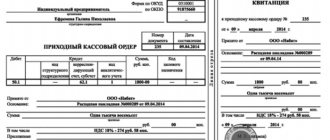September 25, 2014 Comments (0)
This article appeared as a reaction to messages from accounting forums. There you can often find novice accountants looking for answers to the questions: “I want to work as an accountant. What I need to know”, “What a novice accountant should know”, “Where to start studying accounting”. Judging by how many people ask them and how many are trying to help them by giving advice, it is clear that the question is relevant.
I am writing this article because I noticed a pattern in these messages and I cannot remain silent about it. I consider it very important because, in my opinion, it creates confusion in the councils. I'll try to explain now what I mean.
Let's start with the fact that when giving advice, people describe the knowledge and skills that an accountant should have. For example:
“...Laws change at the speed of light, and so does the chart of accounts. Accounting at a confectionery factory is completely different than at a car factory or, in general, at a state-owned enterprise..."
“...she must have a thorough knowledge of accounting and all reporting...”
“...At this stage, the accountant is engaged not only in accounting, but also in financial, management, and tax accounting...”
“...To work as a normal accountant, you must have a specialist. education. And constant self-education - everything changes every day..."
“...To become a good accountant or chief accountant you need to study a lot and constantly learn...”
What might a novice accountant think about?
Personally, I perceive it this way: AN ACCOUNTANT seems to me to be an unattainable ideal, possessing maximum knowledge and virtuoso skills. I imagine such an accountant as a Chief Accountant, having a variety of experience from all areas of activity.
But do these tips help a beginner? Personally, they wouldn't help me. Of course, they would have given me some guidelines, but not specific actions in specific situations.
I want to say - let's use the right words: not ACCOUNTANT, as a collective image. This doesn't help beginners. Let's be specific.
And the specifics are that:
— There are “different” accountants at an enterprise. — the amount of knowledge and requirements for an “accountant” depends on the size of the enterprise and its accounting staff
What positions in accounting do you know?
3 tbsp. 7 of the Federal Law of December 6, 2011 N 402-FZ “On Accounting”):
- or entrust accounting to the chief accountant;
- or entrust accounting to another official of the organization;
- or enter into an agreement for the provision of accounting services.
The head of the organization can also take charge of accounting (Clause 3, Article 7 of the Federal Law of December 6, 2011 N 402-FZ “On Accounting”).
The position of a deputy is a derivative position from the main position contained in the organization’s staffing table.
Considering that in the situation you describe, the staffing table does not provide for the position of “chief accountant,” then, in our opinion, it is not correct to provide for the position of “deputy chief accountant.”
We recommend:
- or provide for the position of “deputy accountant” in the staffing table, taking into account that the position of “accountant” is contained in the staffing table;
- or instead of the position “accountant”, provide in the staffing table the position “deputy general director for finance” (Resolution of the Ministry of Labor and Social Development of the Russian Federation dated 08/21/1998 N 37 “On approval of the Qualification Directory of Positions of Managers, Specialists and Other Employees”, Order of the Ministry of Labor of Russia dated 12.22.2014 N 1061n “On approval of the professional standard “Accountant”).
Mayorova Kristina Alekseevna
Customer Support Expert
This article appeared as a reaction to messages from accounting forums. There you can often find novice accountants looking for answers to the questions: “I want to work as an accountant. What I need to know”, “What a novice accountant should know”, “Where to start studying accounting”. Judging by how many people ask them and how many are trying to help them by giving advice, it is clear that the question is relevant.
I am writing this article because I noticed a pattern in these messages and I cannot remain silent about it. I consider it very important because, in my opinion, it creates confusion in the councils. I'll try to explain now what I mean.
Let's start with the fact that when giving advice, people describe the knowledge and skills that an accountant should have. For example:
“...Laws change at the speed of light, and so does the chart of accounts. Accounting at a confectionery factory is completely different than at a car factory or, in general, at a state-owned enterprise..."
“...she must have a thorough knowledge of accounting and all reporting...”
“...At this stage, the accountant is engaged not only in accounting, but also in financial, management, and tax accounting...”
“...To work as a normal accountant, you must have a specialist. education. And constant self-education - everything changes every day..."
What does the law say?
In accordance with the Resolutions of the Ministry of Labor in the Russian Federation, a Unified Tariff and Qualification Directory has been formed. It includes many issues approved by the same Resolutions of the Ministry of Labor of the Russian Federation with the definition of job titles in the context of each industry, indicating the qualification requirements for vacancies and an approximate list of job responsibilities, the necessary knowledge and characteristics of the work.
Also, Article 195.2 of the Labor Code of the Russian Federation states that the name of the position in the staffing table should be formed taking into account the ETKS in connection with the requirements established for Professional Standards.
That is, the head of the company, when choosing a job title, must take into account several factors, namely:
- compliance of the name with the assigned duties;
- correlation between qualification requirements and job characteristics.
For example, it is acceptable to call a secretary an assistant manager, because the responsibilities are identical. But it is hardly possible to call a mechanic a communications inspector, since the name of the vacancy should be formed taking into account the duties performed, and not a prestigious title.
When are reference books and professional standards required?
Article 195.3 of the Labor Code of the Russian Federation states that compliance with Professional Standards is mandatory for many employers - those that manage companies with state ownership or institutions in which half of the authorized capital belongs to the Russian Federation.
For example, in municipalities, state administrations and other government agencies, the job title must comply with the ETKS and the requirements specified in the specified document, while in other companies the directory can be used as recommendations.
Also, ETKS and professional standards must be observed in cases where workers’ workplaces have working conditions that deviate from the norm and give the right to a certain list of benefits.
Benefits are guaranteed by federal law; therefore, if they are provided, certain requirements apply. For example, the same compliance of the job title with Professional Standards.
So, you can work for 20 years as a painter and breathe in paint fumes, but at the same time have a job title of “construction worker.” This does not comply with the ETKS and does not provide for harmful employment conditions, and therefore the right to early retirement.
That is, in accordance with the law, the list of benefits that the employee will be provided with directly depends on the title of the position only if the title of the vacancy corresponds to the duties performed.
There are several other important factors to consider:
- If the company has a tariff payment system, that is, grades, grades, then in accordance with Article 143 of the Labor Code of the Russian Federation, the name of the vacancy must be established taking into account the standards of the Qualification Directories. This is due to the fact that the list of responsibilities for some positions is given for each category separately, taking into account that the level of qualifications and job characteristics are different.
- In accordance with Article 18 of Federal Law No. 426, when conducting workplace certification, the certification sheet, in addition to general data, also indicates the profession code. This assumes that the job title matches the Qualification Directory. And since certification must be carried out at all enterprises at least once every five years, differences between the actual title of the position and the title of the vacancy in ETKS can lead to violations of the evaluation procedure.
In other cases, compliance with professional standards is advisory in nature. This implies the use of directories only as a standard form, which can be modified taking into account the specifics of the company and the assigned responsibilities, but, nevertheless, not completely ignored.
Can you come up with a name yourself?
As a rule, for institutions belonging to government agencies, the staffing table is established by higher authorities, so they do not have any difficulties with the selection of names, as long as they receive it in ready-made form.
But companies that are commercial structures have many questions when selecting titles, because the list of job responsibilities does not always coincide with the ETKS due to the specifics of work and can be much wider than established standards.
In such a situation, the company’s management can come up with a name on their own, but taking into account both the requirements for professional standards and the grade level for individual positions. If there are no harmful conditions or bad conditions in the company, then the name of the vacancy can be arbitrary, but within reasonable limits, taking into account that the overall work experience in a certain industry sometimes depends on the title of the position.
Let’s say that in some companies there is 1 full-time lawyer, and several specialists are engaged in this area, whose job title may indicate, for example, a specialist in legal work. Or the same watchman can become a security guard for the business unit, since he is in charge only of the company’s local area, and only at night.
A sample order for the introduction of staffing can be found on our website. Is it possible to introduce 0.25 rates into the staffing table? Information is here.
What might a novice accountant think about?
Personally, I perceive it this way: AN ACCOUNTANT seems to me to be an unattainable ideal, possessing maximum knowledge and virtuoso skills. I imagine such an accountant as a Chief Accountant, having a variety of experience from all areas of activity.
But do these tips help a beginner? Personally, they wouldn't help me. Of course, they would have given me some guidelines, but not specific actions in specific situations.
I want to say - let's use the right words: not ACCOUNTANT, as a collective image. This doesn't help beginners. Let's be specific.
And the specifics are that:
— There are “different” accountants at an enterprise. — the amount of knowledge and requirements for an “accountant” depends on the size of the enterprise and its accounting staff
There are “different” accountants
Based on my practice, I will list the main ones:
- Accountant material desk
- Accountant cashier
- Accountant bank
- Accountant for mutual settlements
- Payroll Clerk
- Accountant for fixed assets
- Accountant on checkout
- VAT accountant
- Accountant for purchasing goods
- Chief accountant, putting together all accounting
Do all these options for “accountants” require the same amount of knowledge? Does each of them need to know everything related to accounting, for example:
- tax systems,
- filling out reports,
- ability to calculate salaries,
- name and rules for filling out all primary documents,
- knowledge of all accounting accounts and transactions,
- formation of balance,
- formation of a declaration,
- regulatory documents and laws on accounting/tax accounting?
- and etc.
Isn’t this all the knowledge implied in many pieces of advice? Is it possible for someone who has just embarked on the accounting path to do all this at once? Before I even started working!
Of course, not knowing anything at all is not an option either.
What types of accountants are there? part 1
Our directory resource presents the 2018 OKPDTR classifier with a search by the name of professions, positions with a breakdown by type of activity of workers. All wishes and comments before finalizing the service should be sent to
The All-Russian Classifier of Worker Occupations, Employee Positions and Tariff Grades (OKPDTR) is an integral part of the Unified System of Classification and Coding of Information (USCC) of the Russian Federation, prepared as part of the implementation of the state program for the transition of the Russian Federation to the accounting and statistics system accepted in international practice in accordance with the requirements development of a market economy.
The classifier is designed to solve problems such as:
- Structuring information about specialties and professions existing on the territory of the Russian Federation;
- Control over working conditions, employee qualifications, their wages, pensions and other components of the work process;
- Accounting and assessment of the number of workers and employees involved in certain positions;
- Statistics and data analysis, thanks to the structure of information as a whole for the country or region.
The objects of classification in OKPDTR are the professions of workers and positions of employees. OKPDTR consists of two sections:
The first section - professions of workers - includes professions of workers in accordance with the Unified Tariff and Qualification Directory of Work and Professions of Workers (UTKS), as well as professions of workers whose rights and responsibilities are provided for in the charters, special provisions and relevant regulations regulating the composition of professions in sectors of the economy.
The second section - positions of employees - was developed on the basis of the Unified Nomenclature of Positions of Employees, the Qualification Directory of Positions of Managers, Specialists and Employees, current regulations and other regulatory documents on remuneration issues, taking into account the names of positions used in the economy. The titles of positions of civil servants are given in accordance with Decrees of the President of the Russian Federation “On public positions of the Russian Federation” No. 32 and “On the register of public positions of federal civil servants” No. 33 of January 11, 1995.
How to find a job title in professional standards and reference books
Wherever is more convenient for you.
If you open the professional standard, you can find the job titles recommended by the standard (see below)
as well as job titles from directories.
This is convenient if a professional standard has already been developed for your position, specialty or profession, and you were able to find it.
In the sense that you guessed that “foreman” should be looked for in the professional standard “Organizer of construction work”, and “secretary” - in the professional standard “Specialist in organizational and documentation support for organization management”.
If it is inconvenient for you to search for a job title in a professional standard, or the professional standard you need has not yet been developed, or you want to expand the search for the job title you need, use the EKS, ETKS and OKDTPR directories.
EKS - Unified Qualification Directory of Positions of Managers, Specialists and Other Employees).
ETKS - Unified Tariff and Qualification Directory of Works and Professions of Workers).
OKDTPR - All-Russian classifier of workers' professions, employee positions and tariff categories.
These are valid documents - the law establishes the employer’s right to independently decide what to use - professional standards or reference books.
How to find a job title in professional standards
First, we look for the required professional standard.
Here is the page of the Ministry of Labor website, you can use the standard search by name - find the small “search” button on it and look for the required professional standard.
If you don’t want to use the search, go here and find the desired position in the catalog by area and type of professional activity.
You will see a description of the labor functions related to the professional standard at the top when you open it by clicking.
You can download the professional standards themselves in order to familiarize yourself with their contents here.
You open the professional standard, study it, look for suitable job titles.
Remember, in most cases, the job titles recommended by the professional standard are not mandatory for use.
How to find a ready-made job title in the EKS and ETKS qualification directories
A very important point.
Remember that EKS and ETKS are qualification reference books.
This means that there are no job titles for unskilled workers - there are no janitors or watchmen there.
Therefore, if you need to see a complete list of possible job titles and jobs, take a look at the All-Russian Classifier of Worker Occupations, Employee Positions and Tariff Grades.
As for qualification directories, in the Unified Qualification Directory of positions for managers, specialists and other employees (US), positions are distributed according to Issues of the Unified Qualifications.
I advise you not to focus only on specialized issues of the CEN reference books, since some positions are distributed among the CEN issues almost arbitrarily.
For example, “electrical engineer” is in a publication dedicated to positions in nuclear energy, although there is no mention of nuclear energy in the job description.
In my experience, the most reliable and convenient way is to search alphabetically across all issues of the EKS.
The search results look like this.
Find the required description, check whether the “Characteristics of work” and “Must know” sections are similar to the content of the job and qualification requirements in your company.
If they are similar, use the name from the directory.
If we are talking about a worker, then you are looking for a suitable position in the Unified Tariff and Qualification Directory of Work and Professions of Workers.
The algorithm for working with it is similar to that described above for EKS.
Finally
This article is a continuation of the material How to name a position correctly .
If you want to check whether your position is in Lists 1 and 2 and figure out how to correctly name positions for which the qualification requirements are established by law, read the article About mandatory job titles .
If you are ready to come up with a job title yourself, see the material How to come up with a job title .
Here are links to hh, superjob and rabota - take advantage of the experience of those who have already come up with job titles.
Good luck!
Denis Karandashev
How to come up with a job title without reference books
The recommendations from this article will help you solve this problem.
They are partly taken from regulatory documentation, partly from work practice.
Job titles can be basic or derivative; in derivative titles it is necessary to use complementary words correctly.
In addition, there are special words that are commonly used in job titles.
Always remember the basic principle of choosing a job title - the job title should correspond to the content of the work being performed.
Following this principle and understanding the logic behind the formation of job titles, it is not difficult to come up with a job title.
Basic and derived job titles, variants of derived job titles
Job titles can be basic or derived.
Basic job titles consist of one word that characterizes the typical type of work performed by the position.
Very often, the basic name is enough to name the position correctly.
Examples of basic positions are director, secretary, archivist, designer, foreman, teacher, layout designer, etc.
Derived job titles, as a rule, consist of a base name that defines the typical type of work and additional words, and sometimes even phrases necessary to identify the position.
Using addition words, the nature of the work function performed is described, the specialty or specialization, field of activity, mode and (or) place of work, etc. are indicated.
Addition words can be at the beginning of the job title (“sales manager”), in the middle (“deputy director of management”) or at the end “financial director”).
Enter the site
RSS Print
Category : Profession Replies : 14
You can add a topic to your favorites list and subscribe to email notifications.
« First ← Prev.1 Next → Last (2) »
| Lila [email protected] Wrote 173 messages Write a private message Reputation: | |
| Tell me, has the requirement for two subordinates for the position of manager been abolished? In short, what is the minimum number of subordinates a manager should have? | |
| I want to draw the moderator's attention to this message because: Notification is being sent... |
| Olchik [email hidden] Belarus, Borisov Wrote 67 messages Write a private message Reputation: | #2[181376] May 11, 2010, 16:04 |
Notification is being sent...
| Lila [email protected] Wrote 173 messages Write a private message Reputation: | #3[181389] May 11, 2010, 5:20 pm |
Notification is being sent...
| Lelya [email hidden] Belarus, Minsk Wrote 2823 messages Write a private message Reputation: 797 | #4[181405] May 11, 2010, 6:46 pm |
Notification is being sent...
| Angelica-Marquise of Angels [email hidden] Sineokaya, Minsk Wrote 2753 messages Write a private message Reputation: 612 | #5[181417] May 11, 2010, 19:42 |
Notification is being sent...
| Olchik [email hidden] Belarus, Borisov Wrote 67 messages Write a private message Reputation: | #6[181827] May 12, 2010, 6:58 pm |
Notification is being sent...
| Lila [email protected] Wrote 173 messages Write a private message Reputation: | #7[184478] May 19, 2010, 13:21 |
Notification is being sent...
| tikhan [email protected] Novogrudok Wrote 6516 messages Write a private message Reputation: 1846 | #8[184500] May 19, 2010, 13:49 |
Lila wrote:
Lelya, can you provide a link to the norm that there should be 2 subordinates? Thank you in advance!
I have doubts, but I think that this is it (the norm)
Scroll: RESOLUTION OF THE MINISTRY OF LABOR AND SOCIAL PROTECTION OF THE REPUBLIC OF BELARUS September 20, 2002 No. 123 ON APPROVAL OF THE INSTRUCTIONS ON THE PROCEDURE FOR APPLICATION OF THE UNIFIED TARIFF GRID OF WORKERS OF THE REPUBLIC OF BELARUS
15. A structural unit is understood as an officially designated part of it, headed by a manager subordinate directly to the head of the organization, his deputy or a manager at a higher level of management, created to manage a certain area (type) of the organization’s activities, with independent tasks, functions and responsibilities. Structural divisions can be created taking into account the following controllability standards: management - if it has at least seven staff positions, including the position of a manager; department - if it has at least four staff positions, including the position of a manager; sector (bureau, group) - if it has at least three staff positions, including the position of a manager.
because a smaller number is not specified, then, based on this, the minimum number of subordinates for a leader (manager) is 2 people.
I want to draw the moderator's attention to this message because:Notification is being sent...
"Opinions of the authors may not coincide with his point of view." (V. Pelevin)| Angelica-Marquise of Angels [email hidden] Sineokaya, Minsk Wrote 2753 messages Write a private message Reputation: 612 | #9[184510] May 19, 2010, 2:13 pm |
Notification is being sent...
| Lila [email protected] Wrote 173 messages Write a private message Reputation: | #10[187468] May 28, 2010, 12:31 |
Notification is being sent...
« First ← Prev.1 Next → Last (2) »
In order to reply to this topic, you must log in or register.
Rules for using individual words in job titles
In addition to complying with the general requirements for euphony and ease of pronunciation of job titles, it is worth following some other recommendations:
1. It is undesirable to use job titles that include, in addition to the base title, more than three words, including prepositions, as well as the use of foreign words and/or abbreviations.
2. When determining a position’s labor function for two or more positions, the name may be established:
– for one of the positions, taking into account the largest share of work performed;
– as a double job title (“forwarding driver”).
At the same time, the duties assigned to the employee for each position must be related in content, equal in complexity and in the level of qualification of the employee. “Dentist” is definitely no good.
3. The word “deputy” is used for positions that are introduced to fulfill the duties of the corresponding manager in the event of his temporary absence (vacation, illness, dismissal), or the performance of certain work related to the management of a department or enterprise - you need to indicate which ones.
Do not forget that, according to part two of Art. 59 of the Labor Code of the Russian Federation, you can conclude a fixed-term employment contract with deputy managers, as well as set a longer probationary period and dismiss on special grounds (for example, specified in part five of Article 70 of the Labor Code of the Russian Federation).
If you do not use the word “deputy” in the title of the position, then the application of the above labor law norms to it may be challenged - “financial director” or “commercial director” are not formally deputy managers.
4. The word “chief” in combination with an indication of the profession, specialty or position indicates that the employee is a manager responsible for a certain professional direction and field of activity of the enterprise (chief accountant, chief engineer).
5. The addition word “leader” is used when the position is assigned the functions of a manager and responsible performer of work in one of the areas of activity of a structural unit, or responsibilities for the coordination and methodological guidance of a group of performers.
6. The use of the addition word “senior” is possible provided that the employee, in addition to performing the duties prescribed by his position, supervises the performers subordinate to him.
A position with the derivative “senior” can be established as an exception and in the absence of performers directly subordinate to the employee, if he is entrusted with the functions of managing an independent area of work.
For specialist positions for which qualification categories are provided, the job title “senior” is not used.
7. The basic job title “engineer” can be used only in cases where a specialist needs engineering knowledge at the level of higher education to solve problems arising from the nature of production or type of activity.
8. The basic job title “manager” is used together with derivatives that describe the functions performed, work or belonging to a specific department.
9. The basic title of the position “assistant” is used to name positions related to the performance of general work on behalf of and under the direct control of the head of the organization or (specialist) or with the performance of part of the work assigned to the head of the organization (specialist), as well as individual official assignments under the direct supervision of the head of the organization (specialist).
As an addition, the full name of the position of the manager or specialist is used.
What to do if a discrepancy is detected?
In the event that work in a certain position is associated with the provision of benefits/compensations or there are restrictions on it, it is necessary that the employment contract of this specialist indicate the name and requirements that are contained in the professional standard or in the qualification directory (Article 57 of the Labor Code). At the same time, there may be discrepancies in the title of the position in the reference book and in the professional standard.
If a dispute arises for this reason, it is better to resolve it through discussion at a meeting of the working group, which was created to introduce professional standards at the enterprise. The decision made is documented in a protocol. This safety net will protect you in case of an audit if a discrepancy between the “preferential” position and the name specified in the professional standard is discovered.
You can read about the creation of a working group in our article “Regulations on the working group on the implementation of professional standards.”
Let's consider a number of situations that may arise in practice:
- If the position does not provide any benefits or restrictions, then its name may not coincide with the professional standard, since in this case its implementation is not necessary.
- If the title of the position still needs to be brought into line with the professional standard, then it is necessary to introduce a new position that has the same name as provided in the professional standard. The previous position must be excluded from the staffing table, and the employee himself, with his consent, must be transferred to a new position, making an entry in the work book and personal card.
- If the employee does not agree with such a transfer, he will have to terminate the employment contract with him through the staff reduction procedure, since the new staffing table will exclude positions that are not contained in the professional standard or in the qualification directory (Part 1 of Article 74 of the Labor Code).
IMPORTANT! The unilateral transfer of an employee to a new position is not permitted. It is also worth keeping in mind that an employee cannot be fired solely on the grounds that his knowledge/qualifications do not meet the professional standard.
What else is worth remembering when coming up with a new job title?
1. That the word “manager” denotes a whole class of positions that involve managing people.
Leaders include presidents, directors, and heads of departments.
Therefore, if you use this word in a job title, it’s not that bad, but it’s not very good.
2. About the fact that the word “manager” means “manager”.
Of course, the established practice in Russia allows this word to be used both for the titles of positions related to managing people and for the titles of positions involving responsibility for managing processes, but in the rest of the world, someone who does not manage people is called a “specialist.”
Maybe it will be the same for us, maybe the majority of employees will still be proud of the position “manager of…”.
I think the recommendations listed above are enough to come up with a title for any position.
# What does the name of a position on a resume mean?
In the position title, you define the purpose of the resume - the position you want to take. But applicants often make mistakes when formulating; such errors are conventionally classified into 3 groups:
- Vague job title. The employer does not have the time or desire to carefully study the entire questionnaire in order to determine your desires himself. Especially with great competition and tight deadlines for finding an employee. There is a high probability that the manager will leave candidates with clearer formulations for consideration.
- The line is filled in incorrectly. “Interesting work”, “Discussed”, “Looking for a job”, “Student with no experience”, “Open to any offers” - such text can often be seen in the title. Don’t waste your and other people’s time in vain. Decide on your position and take the trouble to create a worthy presentation of yourself as a professional.
- Listing multiple positions. For example, you saw that a company is looking for a personal assistant, secretary and office manager. These specializations lie on the same professional plane. But their functional responsibilities and financial rewards are different. And if you are impressed by all these vacancies, it is better to create a form for each of them.









